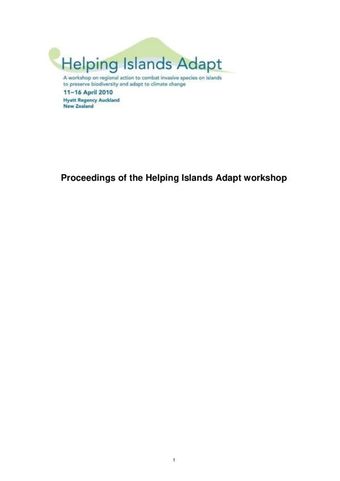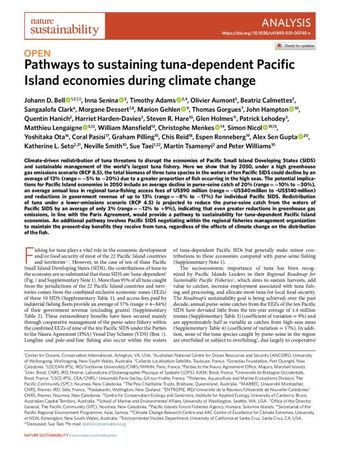Combating Climate Change in the Pacific: Regional Governance, agency and dependency
- Description:
- From the perspective of Pacific island states and territories (PICTs) much of the intense speculation and debate over climate policy seems irrelevant and immature given the oft-repeated warnings of the severe consequences for low-lying islands and atoll countries of climate change. The Pacific is not just any region when it comes to climate change but rather, as Farbotko (2010) argues, is an experimental space of climate change canaries. The position of the Pacific at the frontline of climate change has spurred voluminous research, however studies of the politics of climate change within the region is limited, particularly with regard to and regional processes. This paper explores the regional politics of climate change in the Pacific. Within the grand architecture of global climate governance, the region provides compelling new insights into the ways climate change is constructed, governed, and shaped byand in turn shapesregional and global climate politics. Through an exploration of regional governance as a strategy by which small vulnerable states respond to urgent crises, the paper explores both the potential and the limitations of collective action on environmental issues following the United Nations Climate Change Conference (COP21) in Paris 2015. We argue that evolving regional governance on climate change is mobilizing resources and finance to combat climate change. On the surface it appears to be a successful manifestation of solidarity among states and territories facing a shared fate. This solidarity has been institutionalized in three key regional organizations that mobilize resources climate change action through distinct policy narratives about the place of the Pacific in global climate crisis. These organizations also distribute these resources to members. As a result climate finance in the Pacific is mostly generated by multilateral rather than bilateral donors. However, despite this apparent demonstration of regional agency, beneath the surface regional climate governance is heavily dependent on donors for finance and expertise. This exposes a dual vulnerability of PICTs. They are extremely vulnerable to the impacts of climate change while also being extremely vulnerable to growing dependencies on donors to address these impacts.
- Display date:
- 2016
- Collections:
- Secretariat of the Pacific Regional Environment Programme (SPREP)
- Publisher:
- (Unpublished)
- Content partner:
- Secretariat of the Pacific Regional Environment Programme (SPREP)
- Availability:
- Not specified
-
Copyright status: All rights reservedFind out more about what you are able to do with this itemThis item is all rights reserved, with means you'll have to get permission from Secretariat of the Pacific Regional Environment Programme (SPREP) before using it. For more information, please see our use and reuse page.What can I do with this item?Non-infringing useNZ copyright law does not prevent every use of a copyright work, and this item may be hosted by an international institute or organisation. You should consider what you can and cannot do with a copyright work.No sharingYou may not copy and/or share this item with others without further permission. This includes posting it on your blog, using it in a presentation, or any other public use.No modifyingYou are not allowed to adapt or remix this item into any other works.No commercial useYou may not use this item commercially.
Related items
Welcome and warm Pasifik greetings
The information on this site has been gathered from our content partners.
The names, terms, and labels that we present on the site may contain images or voices of deceased persons and may also reflect the bias, norms, and perspective of the period of time in which they were created. We accept that these may not be appropriate today.
If you have any concerns or questions about an item, please contact us.

